| This article needs additional citations for verification. Please help improve this article by adding citations to reliable sources. Unsourced material may be challenged and removed. Find sources: "List of margraves and electors of Brandenburg" – news · newspapers · books · scholar · JSTOR (December 2024) (Learn how and when to remove this message) |
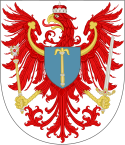
This article lists the Margraves and Electors of Brandenburg during the period of time that Brandenburg was a constituent state of the Holy Roman Empire.
The Mark, or March, of Brandenburg was one of the primary constituent states of the Holy Roman Empire. It was created in 1157 as the Margraviate of Brandenburg by Albert the Bear, Margrave of the Northern March. In 1356, by the terms of the Golden Bull of Charles IV, the Margrave of Brandenburg was given the permanent right to participate in the election of the Holy Roman Emperor with the title of Elector (German: Kurfürst).
The early rulers came from several different dynasties, but from 1415 Brandenburg and its successor states were ruled by the House of Hohenzollern for over 500 years. From 1618 onward, Brandenburg was ruled in personal union with the Duchy of Prussia. The Hohenzollerns raised Prussia to a kingdom as the Kingdom of Prussia in 1701, and from then on Brandenburg was de facto treated as part of the kingdom even though it was legally still part of the Holy Roman Empire. The titles of Margrave of Brandenburg and Elector of Brandenburg were abolished along with the Holy Roman Empire in 1806, and Brandenburg was formally integrated into Prussia. Despite this, the Prussian kings still included the title "Margrave of Brandenburg" in their royal style. From 1871 to 1918 the Hohenzollerns were also German Emperors.
Margraves and Electors of Brandenburg
House of Ascania
For a complete overview of the family's property, see House of Ascania § Rulers of the House of Ascania.Partitions of Brandenburg under Ascanian rule
| Margraviate of Brandenburg (1157-1266/67) | |||||||||
| Krossen (1266–1308) |
Stendal (1266–1318) |
Neumark (1266–1318) |
Salzwedel (1267–1317) |
Stargard (1267–1316) | |||||
| Margraviate of Brandenburg (Neumark then Stendal lines) (1318–1320) |
Annexed to the Duchy of Mecklenburg | ||||||||
Table of rulers
| Ruler | Born | Reign | Death | Ruling part | Consort | Notes | |
|---|---|---|---|---|---|---|---|
| Albert I the Bear |  |
c.1100 | 1157–1170 | 18 November 1170 | Margraviate of Brandenburg | Sophie of Winzenburg 1124 thirteen children |
First Margrave who founded a dynasty in Brandenburg. Ruler of the Northern March from 1134. |
| Otto I |  |
1128 | 1170–1184 | 8 July 1184 | Margraviate of Brandenburg | Judith of Poland 1148 two children Ada of Holland 1175 one child |
Ruled together with his father since 1144. |
| Otto II the Generous |  |
c.1150 | 1184–1205 | 4 July 1205 | Margraviate of Brandenburg | Unmarried | Left no descendants, and the Margraviate went to his brother. |
| Albert II |  |
1177 | 1205–1220 | 25 February 1220 | Margraviate of Brandenburg | Matilda of Lusatia (1185–1225) 1205 four children |
Brother of the previous. |
| Regencies of Henry I, Count of Anhalt (1220–25), Albert I, Archbishop of Magdeburg (1220–21), Matilda of Lusatia (1221–25) | Children of Albert II, ruled jointly, but their children divided the margraviate. | ||||||
| John I |  |
1213 | 1220–1266 | 4 April 1266 | Margraviate of Brandenburg | Sophie of Denmark (1217–1247) 1230 six children Brigitte Jutta of Saxony (d. 4 April 1266) 1230 six children | |
| Otto III the Pious | 1215 | 1220–1267 | 9 October 1267 | Margraviate of Brandenburg | Beatrice of Bohemia 1243 six children | ||
| John II |  |
1237 | 1267–1281 | 10 September 1281 | Margraviate of Brandenburg (at Krossen) |
Hedwig of Werle (1243–1287) c.1260 two children |
Children of John I. Despite co-rulership between them, they received different parts in the Margraviate to rule (alone or in co-rulership):
|
| Otto IV of the Arrow |  |
1238 | 1267–1308 | 27 November 1308 | Margraviate of Brandenburg (at Stendal) |
Heilwig of Holstein-Kiel (d.1305) 1279 no children Judith of Henneberg (d.1315) 1308 no children | |
| Conrad I |  |
1240 | 1267–1304 | 1304 | Margraviate of Brandenburg (at Neumark) |
Constance of Greater Poland 1260 Santok three children | |
| Otto VII |  |
c.1260 | 1286–1297 | 1297 | Margraviate of Brandenburg (at Neumark) |
Unmarried | |
| John III of Prague |  |
1213 | 1267–1268 | 4 April 1266 | Margraviate of Brandenburg (at Salzwedel) |
Unmarried | Children of Otto III. Despite co-rulership between them, they received different parts in the Margraviate to rule (alone or in co-rulership):
|
| Otto V the Tall | 1246 | 1267–1298 | 1298 | Margraviate of Brandenburg (at Salzwedel) |
Judith of Henneberg-Coburg (1252–1327) 22 October 1268 four children | ||
| Otto VI the Short |  |
3/17 November 1264 | 1267–1286 | 6 July 1303 | Margraviate of Brandenburg (at Salzwedel) |
Hedwig of Habsburg February 1279 Vienna no children | |
| Albert III | 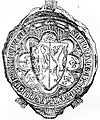 |
c.1250 | 1267–1300 | Between 19 Sept. and 4 Dec. 1300 |
Margraviate of Brandenburg (at Stargard) |
Matilda of Denmark(d.1300) 1268 four children | |
| Conrad II | 1261 | 1281–1308 | 1308 | Margraviate of Brandenburg (at Krossen) |
Unmarried | With his childless death his land reverted to Stendal. | |
| Herman the Tall |  |
1275 | 1298–1308 | 1 February 1308 | Margraviate of Brandenburg (at Salzwedel) |
Anne of Austria 1295 Graz four children |
Children of Otto V, divided the land. Beatrice's part was then annexed to the Duchy of Świdnica-Jawor. |
| Beatrice (I) | 1270 | 1298–1316 | 1316 | Margraviate of Brandenburg (at Upper Lusatia) |
Bolko I, Duke of Świdnica 4 October 1284 Berlin ten children Władysław, Duke of Bytom 21 September 1308 two children | ||
| Beatrice (II) | c.1270 | 1300–1314 | 22 September 1314 | Margraviate of Brandenburg (at Stargard) |
Henry II, Lord of Mecklenburg 1292 Stargard Castle four children |
Daughter and heiress of Albert III. Her marriage transferred the Stargard region into the Duchy of Mecklenburg. | |
| John IV |  |
1261 | 1304–1305 | 1305 | Margraviate of Brandenburg (at Neumark) |
Unmarried | Co-ruler of his father since 1291. His childless death reverted his lands to Stendal. |
| Henry I Lackland | 21 March 1256 | 1308–1318 | 14 February 1318 | Margraviate of Brandenburg (at Delitzsch since 1297; at Stendal since 1308) |
Agnes of Bavaria 1303 three children |
Younger brother of John II, Otto IV and Conrad I. Started his co-rulership in 1297, receiving seat at Delitzsch; he ended up as successor of his childless elder brother Otto IV. | |
| Regency of Waldemar, Margrave of Brandenburg-Stendal (1308–1316) | Children of Herman, divided the land:
John's childless death left the main core of Salzwedel to be reunited by his regent Valdemar. The remaining possessions were annexed by the respective marriages. | ||||||
| John V the Illustrious | 1302 | 1308–1317 | 26 March 1317 | Margraviate of Brandenburg (at Salzwedel) |
Unmarried | ||
| Matilda | 1296 | 1308–1329 | 31 March 1329 | Margraviate of Brandenburg (at Lower Lusatia) |
Henry IV, Duke of Żagań 5 January 1310 four children | ||
| Agnes |  |
1297 | 1308–1334 | 27 November 1334 | Margraviate of Brandenburg (at Altmark) |
Waldemar, Margrave of Brandenburg-Stendal 1309 no children Otto, Duke of Brunswick-Lüneburg 1319 no children | |
| Judith |  |
1301 | 1308–1353 | 1353 | Margraviate of Brandenburg (at Coburg) |
Henry IX, Count of Henneberg-Schleusingen 1 January 1317 or 1 February 1319 five children | |
| Waldemar the Great | 
|
1280 | 1305–1318 | 14 August 1319 | Margraviate of Brandenburg (at Neumark) |
Agnes of Brandenburg-Salzwedel (1297-27 November 1334) 1309 no children |
Son of Conrad, co-ruled with his uncles since 1308. Left no descendants, and the margraviate went to his underage cousin. |
| 1318–1319 | Margraviate of Brandenburg | ||||||
| Regency of Wartislaw IV, Duke of Pomerania (1319–1320) | Son of Henry I. Died as a minor. After the extinction of the Ascanian dynasty in 1320, Brandenburg came under the control of the Emperor Louis IV of the House of Wittelsbach, who granted Brandenburg to his eldest son, Louis V of Bavaria. | ||||||
| Henry II the Child |  |
1302 | 1319–1320 | 26 March 1317 | Margraviate of Brandenburg | Unmarried | |
| Sophia | 1300 | 1320–1356 | 1356 | Margraviate of Brandenburg (at Landsberg) |
Magnus I, Duke of Brunswick-Lüneburg 1327 eight children |
After her death, the Margraviate of Landsberg was annexed to the Duchy of Brunswick-Lüneburg. | |
House of Wittelsbach
| Ruler | Born | Reign | Death | Ruling part | Consort | Notes | |
|---|---|---|---|---|---|---|---|
| Louis I the Brandenburger |  |
May 1315 | 1323–1351 | 18 September 1361 | Margraviate of Brandenburg | Margaret of Denmark 1324 no children Margaret, Countess of Tyrol 10 February 1342 Meran four children |
In 1351 his brothers Louis and Otto gave up their inheritance in Bavaria, in exchange for the Electoral dignity in Brandenburg. |
| Louis II the Roman |  |
7 May 1328 | 1351–1365 | 17 May 1365 | Margraviate of Brandenburg | Cunigunde of Poland before 1349 no children Ingeborg of Mecklenburg-Schwerin 1360 no children |
Elevated in 1356 by the Holy Roman Emperor as First Elector of Brandenburg. |
| Otto the Lazy | 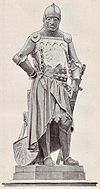 |
1340/42 | 1365–1373 | 15 November 1379 | Electorate of Brandenburg | Catherine of Bohemia 19 March 1366 no children |
Co-ruler of Brandenburg with his brother from 1351, but as a minor (b. 1346) took no part in administration until his brother's death. Abdicated 1373 but retained Electoral title. Died 1379. |
Luxemburg Dynasty
| Image | Name | Began | Ended | Comments |
|---|---|---|---|---|

|
Wenceslaus Wenzel |
2 October 1373 | 29 November 1378 | Emperor Charles IV forced the last Wittelsbach Elector to abdicate, and then installed his own son, Wenceslaus. As Wenceslaus was still a minor (b. 1361), the Emperor administered the margraviate for him. |

|
Sigismund | 29 November 1378 | 1388 | Younger brother of Wenceslaus; took control of Brandenburg on his brother's ascension as King of Germany and Bohemia. Gave up Brandenburg to his cousin Jobst as security for a substantial loan. |

|
Jobst | 1388 | 16 January 1411 | Sigismund's first cousin, nephew of Charles IV. Elected as German King in 1410 in opposition to Sigismund, but died very shortly afterwards. |

|
Sigismund | 16 January 1411 | 30 April 1415 | Following Jobst's death, Sigismund regained control of Brandenburg and was elected undisputed King of Germany. |
House of Hohenzollern
Partitions of Brandenburg under Hohenzollern rule
| Electorate of Brandenburg (1415–1440) |
Margraviate of Brandenburg (under Luxemburg rule) | |||
| Margraviate of Brandenburg (1417–1440) | ||||
| Electorate of Brandenburg and Margraviate of Brandenburg-Brandenburg (1440–1618) |
Margraviate of Brandenburg-Ansbach (1440–1791) |
Margraviate of Brandenburg-Kulmbach (1st creation) (1440–1457) | ||
| Margraviate of Brandenburg-Kulmbach (2nd creation) (1486–1495) | ||||
| Margraviate of Brandenburg-Kulmbach (3rd creation) (1515–1557) | ||||
| Margraviate of Brandenburg-Küstrin (1535–1571) | ||||
| Margraviate of Brandenburg-Bayreuth (changed seat from Kulmbach to Bayreuth) (1603–1769) | ||||
| Electorate of Brandenburg, Duchy of Prussia and Margraviate of Brandenburg-Brandenburg (1618–1701) | ||||
| Margraviate of Brandenburg-Schwedt (1692–1788) | ||||
| Electorate of Brandenburg and Kingdom of Prussia (1701–1806) | ||||
| Kingdom of Prussia (1806–1918) | ||||
Table of rulers
(Note: here, the numbering of the princes is the same for all principalities, as all were titled Margraves of Brandenburg, despite the different parts of land and its particular numbering of the rulers. The princes are numbered by the year of their succession.)
| Ruler | Born | Reign | Death | Ruling part | Consort | Notes | Ref. | |
|---|---|---|---|---|---|---|---|---|
| Frederick I Friedrich I |

|
21 September 1371 | 30 April 1415 – 20 September 1440 | 20 September 1440 | Electorate of Brandenburg | Elisabeth of Bavaria-Landshut 18 September 1401 ten children |
Originally Burgrave of Nuremberg as Frederick VI. Appointed by King Sigismund in 1415 and enfeoffed in 1417. | |
| 1417–1426 | Margraviate of Brandenburg | In spite of being granted with the Electorate in 1415, the Margraviate was only given to him in 1417, which he abdicated to his son in 1426. In 1420 joined all his ancestors' Nurembergian lands with Brandenburg. | ||||||
| John the Alchemist | 
|
1406 | 1426–1440 | 16 November 1464 | Margraviate of Brandenburg | Barbara of Saxe-Wittenberg 1416 four children |
Received the Margraviate of Brandenburg from his father. However, after the latter's death, Brandenburg was redivided, and from then on retained Kulmbach. Abdicated 1457. | |
| 1440–1457 | Margraviate of Brandenburg-Kulmbach | |||||||
| Frederick II Irontooth Friedrich II Eisenzahn |
 |
19 November 1413 | 20 September 1440 – 10 February 1471 | 10 February 1471 | Margraviate and Electorate of Brandenburg | Catherine of Saxony 11 June 1441 Wittenberg three children |
Reunited definitely the Margraviate and the Electorate of Brandenburg; however, his father gave to his brothers the lands of Ansbach and Kulmbach. | |
| Albert I Achilles Albrecht Achilles |

|
9 November 1414 | 1440–1486 | 11 March 1486 | Margraviate of Brandenburg-Ansbach | Margaret of Baden 1446 four children Anna of Saxony 12 November 1458 Ansbach thirteen children |
Received Ansbach after his father's death. In 1457 inherited Kulmbach from his brother John. On the death of his brother in 1471, became Elector. | |
| 1457–1486 | Margraviate of Brandenburg-Kulmbach | |||||||
| 10 February 1471 – 11 March 1486 | Electorate of Brandenburg | |||||||
| John Cicero Johann Cicero |
 |
2 August 1455 | 11 March 1486 – 9 January 1499 | 9 January 1499 | Electorate of Brandenburg | Margaret of Thuringia 15 August 1476 Berlin six children |
Eldest son of Albert Achilles. | |
| Sigismund | 27 September 1468 | 1486–1495 | 26 February 1495 | Margraviate of Brandenburg-Kulmbach | Unmarried | Received Kulmbach after his father's death. Left no descendants, and Kulmbach returned to Ansbach. | ||
| Frederick I the Elder | 
|
8 May 1460 | 1486–1536 | 4 April 1536 | Margraviate of Brandenburg-Ansbach | Sophia of Poland 14 February 1479 Frankfurt (Oder) seventeen children |
Received Ansbach after his father's death. In 1495 inherited the land of his brother. In 1515 the lands were separated again. | |
| 1495–1515 | Margraviate of Brandenburg-Kulmbach | |||||||
| Joachim I Nestor |  |
21 February 1484 | 9 January 1499 – 11 July 1535 | 11 July 1535 | Electorate of Brandenburg | Elizabeth of Denmark 10 April 1502 Berlin five children |
||
| Casimir |  |
27 December 1481 | 1515–1527 | 21 September 1527 | Margraviate of Brandenburg-Kulmbach | Susanna of Bavaria 25 August 1518 Augsburg five children |
Eldest son of Frederick III, received Kulmbach in his father's lifetime. | |
| Regency of George, Margrave of Brandenburg-Ansbach (1527–1541) | Left no descendants, and Kulmbach returned to Ansbach. | |||||||
| Albert II Alcibiades the Warlike |  |
28 March 1522 | 1527–1557 | 8 January 1557 | Margraviate of Brandenburg-Kulmbach | Unmarried | ||
| Joachim II Hector |  |
13 January 1505 | 11 July 1535 – 3 January 1571 | 3 January 1571 | Electorate of Brandenburg | Magdalena of Saxony 6 November 1524 Dresden six children Hedwig of Poland 29 August/1 September 1535 Kraków six children |
First Protestant Elector of Brandenburg. | |
| John |  |
3 August 1513 | 1535–1571 | 13 January 1571 | Margraviate of Brandenburg-Küstrin | Catherine of Brunswick-Wolfenbüttel 11 November 1537 Wolfenbüttel two children |
Son of Elector Joachim I. The Margraviate of Küstrin was created for him. After his death without male descendants, Küstrin was annexed again to the Electorate. | |
| George I the Pious |  |
4 March 1484 | 1536–1543 | 27 December 1543 | Margraviate of Brandenburg-Ansbach | Beatrice de Frangepan 21 January 1509 Gyula no children Hedwig of Münsterberg-Oels 9 January 1525 Oleśnica two children Emilie of Saxony 25 August 1533 four children |
||
| Regencies of Joachim II Hector, Elector of Brandenburg and Philip I, Landgrave of Hesse (1543–1548), John Frederick I, Elector of Saxony (1543–1547) and Maurice, Elector of Saxony (1547–1548) | In 1557, reunited Kulmbach to Ansbach once more. Left no descendants, and the Margraviates passed to sons of the Elector John George. | |||||||
| George Frederick I the Elder | 
|
5 April 1539 | 1543–1603 | 25 April 1603 | Margraviate of Brandenburg-Ansbach | Elisabeth of Brandenburg-Küstrin 26 December 1558 Küstrin no children Sophie of Brunswick-Lüneburg 3 May 1579 Dresden no children |
||
| 1557–1603 | Margraviate of Brandenburg-Kulmbach | |||||||
| John George Johann Georg |
 |
11 September 1525 | 3 January 1571 – 8 January 1598 | 8 January 1598 | Electorate of Brandenburg | Sophie of Legnica 15 February 1545 one child Sabina of Brandenburg-Ansbach 12 February 1548 Ansbach eleven children Elisabeth of Anhalt-Zerbst 6 October 1577 Letzlingen eleven children |
||
| Joachim Frederick Joachim Friedrich |
 |
27 January 1546 | 8 January 1598 – 18 July 1608 | 18 July 1608 | Electorate of Brandenburg | Catherine of Brandenburg-Küstrin 8 January 1570 Küstrin eleven children Eleanor of Prussia 2 November 1603 Berlin one child |
||
| Joachim Ernest |  |
22 June 1583 | 1603–1625 | 7 March 1625 | Margraviate of Brandenburg-Ansbach | Sophie of Solms-Laubach 1612 Ansbach three children |
Son of Elector John George. Received Ansbach | |
| Christian |  |
30 January 1581 | 1603–1655 | 30 May 1655 | Margraviate of Brandenburg-Bayreuth | Maria of Prussia 29 April 1604 Kulmbach nine children |
Son of Elector John George. Received Kulmbach. In 1604 moved the capital of the Margraviate to Bayreuth. From 1604 on, Brandenburg-Kulmbach changed its name to Brandenburg-Bayreuth. | |
| John Sigismund Johann Sigismund |
 |
8 November 1572 | 18 July 1608 – 3 November 1619 | 23 December 1619 | Electorate of Brandenburg | Anna of Prussia 30 October 1594 Königsberg eight children |
Duke of Prussia from 1618. | |
| George William I Georg Wilhelm |
 |
13 November 1595 | 3 November 1619 – 1 December 1640 | 1 December 1640 | Electorate of Brandenburg | Elizabeth Charlotte of the Palatinate 24 July 1616 Heidelberg four children |
His reign was marked by ineffective governance during the Thirty Years' War. Also Duke of Prussia. | |
| Frederick III | 1 May 1616 | 1625–1634 | 6 September 1634 | Margraviate of Brandenburg-Ansbach | Unmarried | Left no descendants. He was succeeded by his brother. | ||
| Albert II |  |
18 September 1620 | 1634–1667 | 22 October 1667 | Margraviate of Brandenburg-Ansbach | Henriette Louise of Württemberg-Mömpelgard 31 August 1642 Stuttgart three children Sophie Margarete of Oettingen-Oettingen 15 October 1651 Oettingen five children Christine of Baden-Durlach 6 August 1665 Durlach no children |
||
| Frederick William I the Great Elector Friedrich Wilhelm |
 |
16 February 1620 | 1 December 1640 – 29 April 1688 | 29 April 1688 | Electorate of Brandenburg | Louise Henriette of Nassau 7 December 1646 The Hague six children Sophia Dorothea of Schleswig-Holstein-Sonderburg-Glücksburg 13 July 1668 Gröningen seven children |
Also Duke of Prussia. | |
| Christian Ernest |  |
6 August 1644 | 1655–1712 | 20 May 1712 | Margraviate of Brandenburg-Bayreuth | Erdmuthe Sophie of Saxony 29 October 1662 Dresden no children Sofie Louise of Württemberg 8 February 1671 Stuttgart six children Elisabeth Sophie of Brandenburg 30 March 1703 Potsdam nine children |
Son of Erdmann August, son of Christian I. | |
| John Frederick |  |
18 October 1654 | 1667–1686 | 22 March 1686 | Margraviate of Brandenburg-Ansbach | Johanna Elisabeth of Baden-Durlach 26 January 1673 Durlach five children Eleonore Erdmuthe of Saxe-Eisenach 4 November 1681 Eisenach three children |
||
| Council of Regency (1686–1692) | Died as a minor; he was succeeded by his brother. | |||||||
| Christian Albert | 18 September 1675 | 1686–1692 | 16 October 1692) | Margraviate of Brandenburg-Ansbach | Unmarried | |||
| Frederick III Friedrich I |
 |
11 July 1657 | 29 April 1688 – 25 February 1713 | 25 February 1713 | Electorate of Brandenburg | Elisabeth Henriette of Hesse-Kassel 13 August 1679 Potsdam one child Sophia Charlotte of Hanover 8 October 1684 Herrenhausen two children Sophia Louise of Mecklenburg-Schwerin 28 November 1708 Berlin no children |
Also Duke of Prussia. In 1701 became the first King in Prussia, as Frederick I. | |
| Electorate and Margraviate of Brandenburg annexed to Prussia | ||||||||
| George Frederick II |  |
3 May 1678 | 1692–1703 | 29 March 1703 | Margraviate of Brandenburg-Ansbach | Unmarried | Died without descendants; he was succeeded by his brother. | |
| Philip William |  |
19 May 1669 | 1692–1711 | 19 December 1711 | Margraviate of Brandenburg-Schwedt | Johanna Charlotte of Anhalt-Dessau 25 January 1699 Oranienbaum six children |
Son of Elector Frederick William I. The Margraviate of Schwedt was created for him. | |
| William Frederick |  |
8 January 1686 | 1703–1723 | 7 January 1723 | Margraviate of Brandenburg-Ansbach | Christiane Charlotte of Württemberg-Winnental 28 August 1709 Stuttgart three children |
||
| Frederick William |  |
17 November 1700 | 1711–1771 | 4 March 1771 | Margraviate of Brandenburg-Schwedt | Sophia Dorothea of Prussia 10 November 1734 Potsdam five children |
Left no male descendants. The title passed to his brother, Frederick Henry. | |
| George William |  |
26 November 1678 | 1712–1726 | 18 December 1726 | Margraviate of Brandenburg-Bayreuth | Sophie of Saxe-Weissenfels 16 October 1699 Leipzig five children |
||
| Regency of Christiane Charlotte of Württemberg-Winnental (1723–1729) | ||||||||
| Charles William Frederick the Wild Margrave |  |
12 May 1712 | 1723–1757 | 3 August 1757 | Margraviate of Brandenburg-Ansbach | Friederike Luise of Prussia 30 May 1729 Berlin two children |
||
| George Frederick Charles |  |
30 June 1688 | 1726–1735 | 17 May 1735 | Margraviate of Brandenburg-Bayreuth | Princess Dorothea of Schleswig-Holstein-Sonderburg-Beck 17 April 1709 Reinfeld five children |
||
| Frederick |  |
10 May 1711 | 1735–1763 | 26 February 1763 | Margraviate of Brandenburg-Bayreuth | Wilhelmine of Prussia 17 April 1709 Berlin one child Sophie Caroline of Brunswick-Wolfenbüttel 20 September 1759 Brunswick no children |
Left no male descendants; the title passed to Frederick Christian, from a collateral Bayreuth line. | |
| Frederick Christian |  |
17 July 1708 | 1763–1769 | 20 January 1769 | Margraviate of Brandenburg-Bayreuth | Victoria Charlotte of Anhalt-Zeitz-Hoym 26 April 1732 Schaumburg two children |
Great-grandson of Christian I and cousin of his predecessors. Left no male descendants; Bayreuth was reunited to Ansbach. | |
| Bayreuth definitively annexed to Ansbach | ||||||||
| Charles Alexander |  |
24 February 1736 | 1757–1791 | 5 January 1806 | Margraviate of Brandenburg-Ansbach | Frederica Caroline of Saxe-Coburg-Saalfeld 22 November 1754 Coburg no children Elizabeth Craven 13/30 October 1791 Lisbon morganatic no children |
In 1769 reunited both Margraviates of Ansbach and Bayreuth.In 1791 sold both Margraviates to the Kingdom of Prussia. | |
| Frederick Henry |  |
21 August 1709 | 1771–1788 | 12 December 1788 | Margraviate of Brandenburg-Schwedt | Leopoldine Marie of Anhalt-Dessau 13 February 1739 two children |
Left no male descendants. Schwedt went back to the Electorate. | |
| Schwedt definitively annexed to Prussia | ||||||||
| ||||||
Titular Margraves of Brandenburg after 1806
This includes Kings of Prussia with the title of Margrave of Brandenburg (1806–1918) and pretenders to the throne of Prussia (1918–present)
| Margrave | Portrait | Lifespan | Reign start | Reign end |
|---|---|---|---|---|
| Frederick William V Friedrich Wilhelm III |

|
3 August 1770 – 7 June 1840 | 6 August 1806 | 7 June 1840 |
| Frederick William VI Friedrich Wilhelm IV |
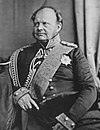
|
15 October 1795 – 2 January 1861 | 7 June 1840 | 2 January 1861 |
| William I Wilhelm I |
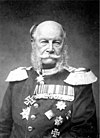
|
22 March 1797 – 9 March 1888 | 2 January 1861 | 9 March 1888 |
| Frederick VIII Friedrich III |
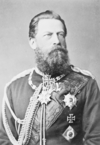
|
18 October 1831 – 15 June 1888 | 9 March 1888 | 15 June 1888 |
| William II Wilhelm II |
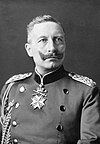
|
27 January 1859 – 4 June 1941 | 15 June 1888 | Prussian monarchy abolished on 28 November 1918 4 June 1941 |
| William III Wilhelm III |
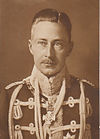
|
6 May 1882 – 20 July 1951 | 4 June 1941 | 20 July 1951 |
| Louis Ferdinand Ludwig Ferdinand I |

|
9 November 1907 – 26 September 1994 | 20 July 1951 | 26 September 1994 |
| George Frederick III Georg Friedrich I |

|
10 June 1976 – present | 26 September 1994 | Incumbent |
Family tree
|
The colours denote the Margraves and Electors of various partitions of Brandenburg: |
|
– Margraves and Electors of Brandenburg – Margraves of Brandenburg-Kulmbach |
– Margraves of Brandenburg-Stendal – Margraves of Brandenburg-Ansbach |
– Margraves of Brandenburg-Salzwedel – Margraves of Brandenburg-Bayreuth |
– Margraves of Brandenburg-Küstrin – Margraves of Brandenburg-Schwedt |
See also
- List of consorts of Brandenburg
- Lists of political office-holders in Brandenburg
- List of monarchs of Prussia
References
- Schneider, Frank (1952). Geschichte der formellen Staatswirtschaft von Brandenburg-Preussen (in German). Duncker & Humblot. p. 51. ISBN 9783428013524 – via Google Books.